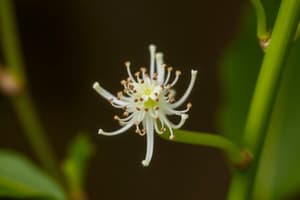Podcast
Questions and Answers
Which method of reproduction involves a new plant growing from a fragment or cutting of the parent plant?
Which method of reproduction involves a new plant growing from a fragment or cutting of the parent plant?
- Clonal reproduction
- Asexual reproduction (correct)
- Sexual reproduction
- Seed production
What term is used to describe specialized reproductive structures in plants that can be used for vegetative reproduction?
What term is used to describe specialized reproductive structures in plants that can be used for vegetative reproduction?
- Asexual organs
- Specialized buds
- Clonal units
- Reproductive propagules (correct)
Why do some plants reproduce through vegetative propagation instead of seed production?
Why do some plants reproduce through vegetative propagation instead of seed production?
- It allows plants to produce more offspring per unit of resource (correct)
- It allows for genetic diversity
- It is not evolutionary advantageous
- It leads to accumulation of deleterious mutations
Which type of plants typically lack a vascular cambium, making them more challenging to propagate?
Which type of plants typically lack a vascular cambium, making them more challenging to propagate?
What is the process of plant reproduction of a species or cultivar, and it can be sexual or asexual?
What is the process of plant reproduction of a species or cultivar, and it can be sexual or asexual?
Vegetative reproduction allows for genetic diversity and accumulation of deleterious mutations
Vegetative reproduction allows for genetic diversity and accumulation of deleterious mutations
Horticulturists have developed asexual propagation techniques using vegetative propagules to replicate plants
Horticulturists have developed asexual propagation techniques using vegetative propagules to replicate plants
Monocotyledons typically lack a vascular cambium, making them more challenging to propagate
Monocotyledons typically lack a vascular cambium, making them more challenging to propagate
Plants reproduce exclusively through vegetative reproduction to ensure genetic diversity
Plants reproduce exclusively through vegetative reproduction to ensure genetic diversity
Juveniles of a plant are easier to propagate vegetatively
Juveniles of a plant are easier to propagate vegetatively
Vegetative reproduction is a form of asexual reproduction occurring in plants.
Vegetative reproduction is a form of asexual reproduction occurring in plants.
Plants can only reproduce through vegetative reproduction.
Plants can only reproduce through vegetative reproduction.
Horticulturists have not developed asexual propagation techniques using vegetative propagules.
Horticulturists have not developed asexual propagation techniques using vegetative propagules.
Monocotyledons typically lack a vascular cambium, making them more challenging to propagate.
Monocotyledons typically lack a vascular cambium, making them more challenging to propagate.
Vegetative reproduction allows for genetic diversity and accumulation of deleterious mutations.
Vegetative reproduction allows for genetic diversity and accumulation of deleterious mutations.
Study Notes
Reproductive Methods in Plants
- Fragmentation or cutting of the parent plant leads to vegetative reproduction.
- Specialized structures for vegetative propagation in plants are called vegetative propagules.
Reasons for Vegetative Reproduction
- Some plants favor vegetative propagation to maintain genetic diversity.
- Exclusively reproducing through vegetative methods helps avoid the accumulation of harmful mutations.
- Juvenile plants are often easier to propagate vegetatively.
Challenges in Plant Propagation
- Monocotyledons generally lack a vascular cambium, complicating propagation efforts.
- Techniques for asexual propagation have been developed by horticulturists to replicate plants using vegetative propagules.
Plant Reproduction Processes
- Plant reproduction can occur through two primary methods: sexual and asexual.
- Vegetative reproduction is a form of asexual reproduction that allows for distinct genetic outcomes in offspring.
Studying That Suits You
Use AI to generate personalized quizzes and flashcards to suit your learning preferences.
Description
Test your knowledge about vegetative reproduction, a form of asexual reproduction in plants where a new plant grows from a fragment or cutting of the parent plant. Explore the natural and artificial induction of vegetative propagation techniques.




